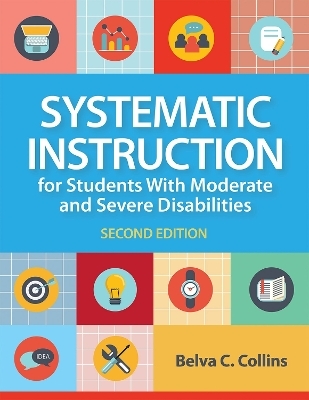
Systematic Instruction for Students with Moderate and Severe Disabilities
Brookes Publishing Co (Verlag)
978-1-68125-438-8 (ISBN)
To improve outcomes for students with moderate and severe disabilities, K–12 educators need to understand the why and how of good instructional practices. They’ll find comprehensive guidance in the second edition of this bestselling text on systematic instruction, a highly effective teaching approach rooted in applied behavior analysis (ABA).
Fully revised and updated with timely topics and new sample lesson plans, this reader-friendly textbook prepares teachers to use dynamic, adaptable systematic instruction strategies to teach core content that is age-appropriate, meaningful, and relevant to students’ lives. Educators will discover evidence-based methods that help them with every step of systematic instruction, from collecting accurate screening and baseline data to supporting students as they generalize new skills to other settings. And faculty members will get a complete package of online instructor materials they can use in their courses, including test banks, PowerPoint slides, flowcharts for instructional procedures, and blank data sheets.
Written by a seasoned educator with decades of experience training a multitude of teachers, this is the accessible, up-to-date text today’s teachers need to succeed in inclusive classrooms and improve outcomes for students with moderate and severe disabilities.
WHAT’S NEW:
Revised and updated chapters throughout, with a wealth of practical strategies
A full package of online faculty materials
14 new sample lesson plans, including learning objectives, instructional contexts, materials needed, teaching procedures, data-collection guidelines, maintenance and generalization strategies, and lesson extensions and variations
Insightful commentary from special educators in each chapter
More on working with parents and caregivers
Guidance in each chapter about adapting systematic instruction methods for distance learning
New chapter on making instructional decisions and exercising leadership
Explicit guidance on combining functional core content with standards-based instruction
More on inclusion and culturally responsive practices
Up-to-date research on systematic instruction
SELECTED TOPICS COVERED:
developing data sheets ·
collecting baseline data ·
designing effective instructional programs ·
using response prompting strategies ·
using technology to enhance instruction ·
applying ABA principles ·
increasing the efficiency of instruction ·
facilitating maintenance and generalization ·
exercising educational leadership
Belva C. Collins, Ed.D., served as a professor and chair in the Department of Special Education and Child Development at the University of North Carolina at Charlotte and in the Department of Early Childhood, Special Education, and Counselor Education at the University of Kentucky. She now holds the title of Professor Emeritus at both institutions. Dr. Collins began her career as a teacher of students with intellectual disability in rural Southwestern Virginia before coming to the University of Kentucky to work as a research assistant on several federally funded grants to validate the use of response prompting strategies in special education. She continued this line of research throughout her career in higher education and was successful in guiding the applied research of her students in investigating variations of systematic instruction in classroom and community settings. This work provides the foundation for this text. In addition to disseminating her own scholarly writing, Dr. Collins served as the executive editor of Rural Special Education Quarterly, the primary publication of the American Council on Rural Special Education (ACRES). Recent awards include the ACRES Eagle Award for service to rural special education, the North Carolina Teacher Educator Award, and the TED-Pearson Award for excellence in teacher education. She now devotes her time to writing and presenting on the topics of systematic instruction and special education teacher leadership.
About the Downloads
About the Author
Preface
Foreword Erik Carter, Ph.D.
Acknowledgments
Section I Setting the Context for Systematic Instruction
Chapter 1 Using Systematic Instruction When Teaching Standards in Inclusive Classrooms
Chapter 2 Using Technology with Systematic Instruction
Chapter 3 Involving Others in Implementing Systematic Instruction
Chapter 4 Developing Data Sheets and Collecting Baseline Data
Chapter 5 Using Effective Practices to Teach Learners with Moderate and Severe Disabilities
Section II Delivering Systematic Instruction
Chapter 6 Applying the Principles of ABA to Teach Learners with Moderate and Severe Disabilities
Chapter 7 Using Response Prompting Strategies: Graduated Guidance, Most-to-Least Prompting, and System of Least Prompts
Chapter 8 Using Response Prompting Strategies: Time Delay and Simultaneous Prompting Procedures
Chapter 9 Increasing the Efficiency of Instruction
Chapter 10 Facilitating Maintenance and Generalization
Chapter 11 Making Instructional Decisions and Exercising Leadership
Chapter 11 Appendix Flowchart for Designing Instructional Programs Using Response Prompting Procedures
Appendix A Sample Programs Using Systematic Instruction
Appendix B Glossary
Index
| Erscheinungsdatum | 01.10.2021 |
|---|---|
| Verlagsort | Baltimore |
| Sprache | englisch |
| Maße | 213 x 276 mm |
| Gewicht | 715 g |
| Themenwelt | Sozialwissenschaften ► Pädagogik ► Sonder-, Heil- und Förderpädagogik |
| ISBN-10 | 1-68125-438-7 / 1681254387 |
| ISBN-13 | 978-1-68125-438-8 / 9781681254388 |
| Zustand | Neuware |
| Haben Sie eine Frage zum Produkt? |
aus dem Bereich


